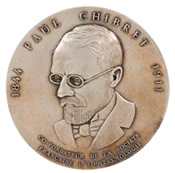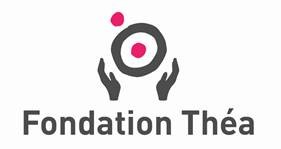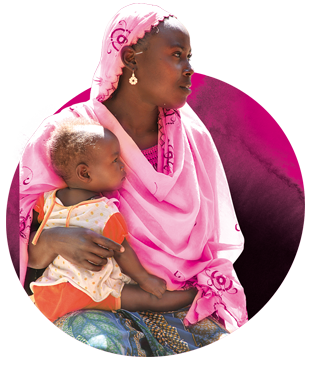A precursor in the humanitarian field, Paul Chibret (1844-1911) came across trachoma, then called Egyptian ophthalmia. This terrible inflammation of the conjunctiva is caused by a highly contagious bacterium, chlamydiae trachomatis, which spreads rapidly in impoverished households. Paul was haunted by images of this destructive disease to such an extent that by the end of the nineteenth century he was considered one of the best French specialists in this disease. A fervent supporter of the internationalisation of knowledge, he founded the SFO (Société Française d'Ophtalmologie: French Society of Ophthalmology) in 1883 and immediately opened membership to foreign doctors.
 In honour of the memory of this philanthropist, all Paul Chibret's descendants have dedicated themselves, each in his own way, to the fight against trachoma and the diffusion of knowledge in the field of ophthalmology. After the Second World War, Jean Chibret (1915-1989), who had turned the laboratory founded by his father, Henry, into a European leader, carried on the tradition by actively supporting the fight against trachoma in North African countries. He also inaugurated the world's largest ophthalmological documentation centre (The Chibret Institute), used by young specialists from all over the world.
In honour of the memory of this philanthropist, all Paul Chibret's descendants have dedicated themselves, each in his own way, to the fight against trachoma and the diffusion of knowledge in the field of ophthalmology. After the Second World War, Jean Chibret (1915-1989), who had turned the laboratory founded by his father, Henry, into a European leader, carried on the tradition by actively supporting the fight against trachoma in North African countries. He also inaugurated the world's largest ophthalmological documentation centre (The Chibret Institute), used by young specialists from all over the world.
At the dawn of the twenty-first century, Henri and Jean-Frédéric Chibret have perpetuated and strengthened this family tradition in Laboratoires Théa through the provision of grants, medical training for healthcare professionals, humanitarian donations and financing scientific journals. Access to healthcare for the most vulnerable populations and knowledge sharing remain the rationale behind the Fondation Théa .





 In honour of the memory of this philanthropist, all Paul Chibret's descendants have dedicated themselves, each in his own way, to the fight against trachoma and the diffusion of knowledge in the field of ophthalmology. After the Second World War, Jean Chibret (1915-1989), who had turned the laboratory founded by his father, Henry, into a European leader, carried on the tradition by actively supporting the fight against trachoma in North African countries. He also inaugurated the world's largest ophthalmological documentation centre (The Chibret Institute), used by young specialists from all over the world.
In honour of the memory of this philanthropist, all Paul Chibret's descendants have dedicated themselves, each in his own way, to the fight against trachoma and the diffusion of knowledge in the field of ophthalmology. After the Second World War, Jean Chibret (1915-1989), who had turned the laboratory founded by his father, Henry, into a European leader, carried on the tradition by actively supporting the fight against trachoma in North African countries. He also inaugurated the world's largest ophthalmological documentation centre (The Chibret Institute), used by young specialists from all over the world. 
